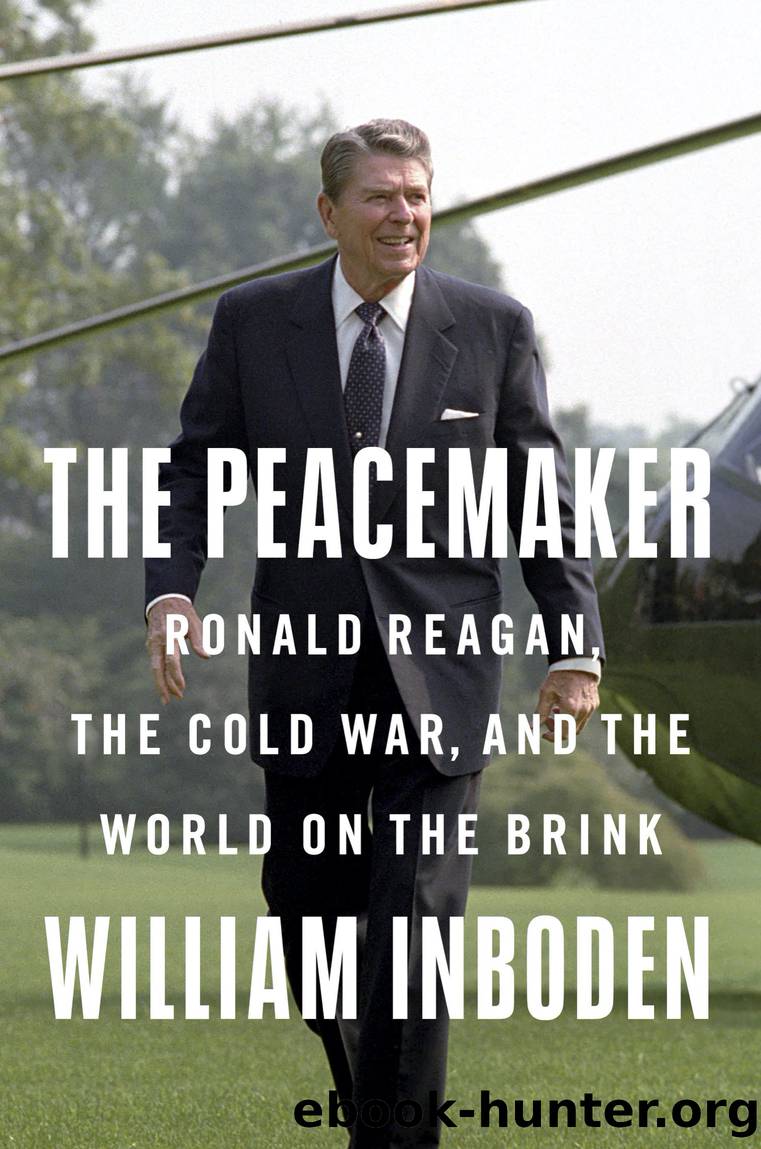The Peacemaker: Ronald Reagan, the Cold War, and the World on the Brink by William Inboden

Author:William Inboden [Inboden, William]
Language: eng
Format: epub
Publisher: Penguin Publishing Group
Published: 2022-11-15T00:00:00+00:00
VIII
Sometime on the evening of March 10, Konstantin Chernenko breathed his last. A four a.m. phone call from McFarlane woke Reagan with the news that yet another Soviet premier had died. Reagan told his diary, âMy mind turned to whether I should attend the funeral. My gut instinct said no.â Once again he would send Bush instead. This was not from lack of hope over a new start with the Soviets. A state funeral in Moscow, with its congeries of world leaders and lugubrious Soviet ceremonies, was not the right occasion to seek it.[50]
Now in the fifth year of his presidency, Reagan had yet to meet a Soviet counterpart. He would quip that he wanted to but âthey kept dying on me.â[51] The third Kremlin leader to expire in less than three years symbolized the decay of the entire Soviet edifice.
Within hours of Chernenkoâs death, Moscow announced his successor as general secretary of the Communist Partyâthe USSRâs supreme position, since the party reigned over the state. To the surprise of almost no one, it was Mikhail Gorbachev. Having just turned fifty-four a week earlier, Gorbachev would be the first Soviet leader of the postwar generation. The Politburo realized that its festering structural rot could not be cured by another geriatric ideologue in the mold of Brezhnev, Andropov, and Chernenko. Even the pertinacious Gromyko backed Gorbachev.
Reagan hoped that Gorbachev would be the Kremlin reformer that since 1981 he had been waiting forâand pressuring the Soviet system to produce. While Gorbachevâs accession stemmed primarily from larger dynamics within the Soviet systemâas well as his vision and shrewd maneuveringâReaganâs policies also played a role. Even one of Gorbachevâs own advisors admitted his selection resulted in part from âinternal domestic pressures and Reaganâs rigid position,â leading to Kremlin fears of âfalling behindâ the United States.[52]
Gorbachev in turn sensed that his most important international relationship would be with Reagan. On his first day in office, he directed his aide Alexander Yakovlev to assess the American president. âReagan is trying persistently to capture the initiative in international affairs,â Yakovlev observed. âHe would like to solve a number of problems in the context of [his] dream about a âgreat peace-maker president.âââ[53] Ironically, this Kremlin analysis perceived Reagan more accurately than did much of the American media and academia, still stuck on portraying him as a simpleminded warmonger.
But the White House could not yet tell who Gorbachev was, or would be. Reagan received conflicting assessments from his own team. The day after the Kremlin announced Gorbachev as its new leader, NSC staff member John Lenczowski wrote a memo for Reagan expressing doubt that âthe generational change in the Soviet leadership will mean significant changes in Soviet policy.â His was not a lone voice; Deputy National Security Advisor John Poindexter added in black marker, âEveryone agrees with this analysis,â and NSC Soviet specialists Steve Sestanovich and Ty Cobb co-signed it.[54]
Bush had a different take. On board Air Force Two, returning from the Moscow funeral, the vice president dictated a cable to Reagan with his impression of Gorbachev.
Download
This site does not store any files on its server. We only index and link to content provided by other sites. Please contact the content providers to delete copyright contents if any and email us, we'll remove relevant links or contents immediately.
| U.K. Prime Ministers | U.S. Presidents |
Waking Up in Heaven: A True Story of Brokenness, Heaven, and Life Again by McVea Crystal & Tresniowski Alex(37786)
Empire of the Sikhs by Patwant Singh(23073)
We're Going to Need More Wine by Gabrielle Union(19034)
Hans Sturm: A Soldier's Odyssey on the Eastern Front by Gordon Williamson(18574)
Leonardo da Vinci by Walter Isaacson(13316)
The Radium Girls by Kate Moore(12018)
Tools of Titans by Timothy Ferriss(8366)
Educated by Tara Westover(8046)
How to Be a Bawse: A Guide to Conquering Life by Lilly Singh(7472)
Permanent Record by Edward Snowden(5838)
The Last Black Unicorn by Tiffany Haddish(5629)
The Rise and Fall of Senator Joe McCarthy by James Cross Giblin(5275)
Promise Me, Dad by Joe Biden(5141)
The Wind in My Hair by Masih Alinejad(5092)
A Higher Loyalty: Truth, Lies, and Leadership by James Comey(4954)
The Crown by Robert Lacey(4807)
The Iron Duke by The Iron Duke(4349)
Joan of Arc by Mary Gordon(4101)
Stalin by Stephen Kotkin(3957)
